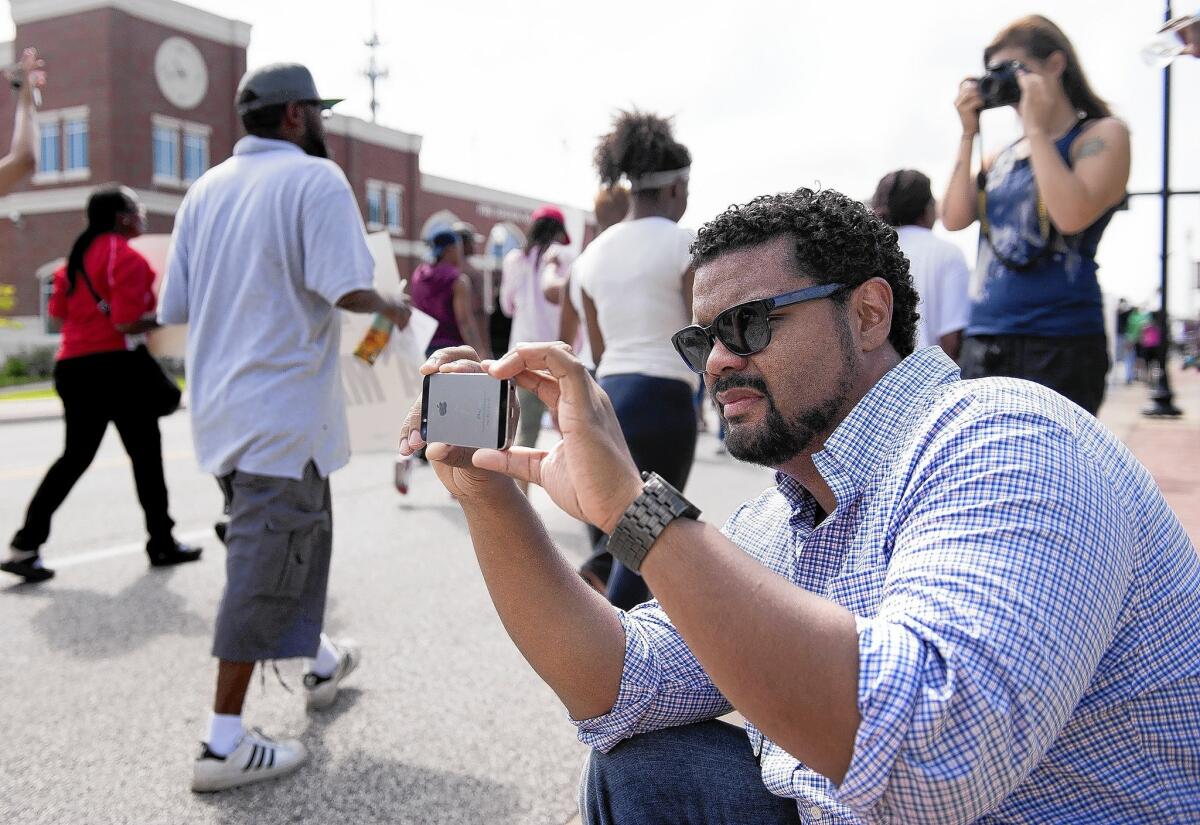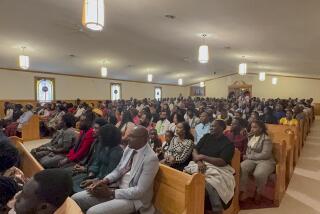Amid Ferguson unrest, Antonio French finds a national following

- Share via
FERGUSON, Mo. — Antonio French sat in the front passenger seat of an air-conditioned sedan parked behind vandalized and boarded-up Red’s BBQ on West Florissant Avenue, scrolling through his iPhone, reading a barrage of tweets, emails and text messages.
Nods of appreciation and media interview requests have kept his phone vibrating these last few weeks.
“It’s been like a blur,” said French, in a respite from the muggy afternoon air. “We’ve been out here every day trying to maintain some focus.”
It’s a new reality for the St. Louis native and alderman.
In the two weeks since a white police officer shot and killed Michael Brown, an unarmed 18-year-old black man, French has become a pinnacle figure in what’s evolved into a national call for justice.
It was French’s social media posts, with frequent updates, that allowed the country early on to look directly inside the protests in Ferguson, where tear gas and rubber bullets threatened to become routine. And it was French’s usually reasonable but always frank words that gave Ferguson’s black population its voice in the days after the shooting.
On Tuesday, when violence again threatened to get out of hand, he wrote on Twitter about how outside agitators were making things worse: “The white guy on the left is the one who was trying to incite a riot last night. He came here from Chicago. #Ferguson.” French took a picture of the group and attached it to the message.
In the last two weeks, French has been arrested for unlawful assembly, has publicly assailed local prosecutors for not charging Officer Darren Wilson — who shot Brown on Aug. 9 — and has helped to cool countless young tempers set on acting out through violence.
“I’ve just been right here, just helping my people. This is personal to me. This is my home,” said French, pointing his index finger to the front side of the barbecue restaurant on West Florissant, where protests took place 12 nights in a row. “I like to think I was doing solid things for this region, for this community, before the world started watching us.”
It was not a given he would take on such a role. He was elected alderman in 2009 to represent St. Louis’ Ward 21. As the unrest escalated in the nearby suburb, though, it was French who helped mobilize local elected officials and the clergy to help bring peace to the streets.
Although Ferguson has its own mayor, James Knowles III, and six council members — five white, one black — none have had much of a presence during the unrest. It wasn’t until Tuesday that national viewers heard from the mayor. Ahead of a night that would turn violent, Knowles defended his city, telling MSNBC that there was “no racial divide” in Ferguson. That only made him look out of touch. French, in contrast, gained a huge national following by wading into the crowd and capturing the images of those hot, tense days and police-heavy nights.
French’s roots in St. Louis date back to the 1960s. His parents grew up on the same block where he was raised and now lives with his wife, Jasenka, and 3-year-old son, Dominik. A graduate of Auburn University in Alabama — where he studied political science — French returned home in 2000 and became involved in municipal and state politics. For years, his local consulting firm helped manage and map out campaign victories for Democrats in the St. Louis area.
But campaign politics wasn’t his lone interest.
“When I was doing campaigns it was about getting good people into office — that’s a service to the community. At the time, we needed new representation,” he said of his north St. Louis neighborhood. “So I put my hat in the ring.”
After being elected, French set his sights on the issue that upset him most at the time: underperforming public schools. He went on to spearhead North Campus, an education program modeled after the Harlem Children’s Zone in New York that tutors elementary and middle school students in north St. Louis.
“So he has been in this community contributing his knowledge and love to the place that’s been his home his whole life,” said the Rev. Spencer Lamar Booker of St. Paul AME Church. “He’s a good brother, who in this darkest of tragedies has given us a voice and shown us a light.”
French, who sits on the city’s public safety committee, has been a vocal critic of the St. Louis police. When the state ceded oversight of the department to the city about a year ago, it was French who pushed for police officials to provide monthly reports on homicides and arrests, said St. Louis Public Safety Director Richard Gray.
“It’s rare to see so much passion in an elected official. Usually they’re much more reserved. But not Antonio. This is his community. ... Now with this tragic situation taking place here, the country sees him at work,” Gray said.
Much like with the public schools in St. Louis, French said, change is needed when it comes to voting in the city. Turnout over the last two years in Ferguson municipal elections was about 12%, according to St. Louis County election board records. Many of the elected officials in the predominantly black suburb are white. Knowles, for example, was elected last time with 49% of the vote, but a vote that was overwhelmingly white.
“This has to change. If people want to see change in how they’re represented, they need to register and vote,” French said.
Still, there has been sniping from some black local and state elected officials about the St. Louis alderman being so vocal about issues in Ferguson, perhaps in response to French’s sudden fame, but more likely because of the next St. Louis mayoral election, in 2017. The current mayor, Francis Slay, has kept a low profile during the unrest and might not seek a fifth term.
Yet Umar Lee, once a political adversary of French, has nothing but praise now.
“He’s used his platform as an elected official to bring the community together to demand answers,” Lee said. “These children are out in these streets getting gunned down for no reason.”
On a recent evening, as French walked the length of a milelong area of West Florissant where protesters have been allowed to march, several people stopped to shake his hand or ask for a photo.
“That brother right here will be the next mayor of St. Louis. I guarantee that,” said Felicia King, a resident of north St. Louis, who posed for a picture with French.
“Ah, thank you, ma’am,” said a grinning French.
French says there’s little time for him to ponder his own future with the tragedy of Brown’s death hanging over the community. He’s looking to help heal the metro area by forming a community-based group called #HealSTL, which will lease office space along West Florissant in the coming weeks.
To be sure, he isn’t above touting his newfound status, tweeting on Thursday, “I’ll be on @CNN with @andersoncooper in a few minutes discussing #Ferguson and #HealSTL. Tune in.”
On Saturday, he wrote to his 121,000 followers that there would be a voter registration drive in Ferguson: “If you want to help, bring water, clipboards, black pens, ice, trash bags, a tent, or just your smiling face. Let’s get to work. #HealSTL”
“We just need to take it one day at a time,” French saidin an interview. “Working together and finding common ground will help us get through this.”
Varun Madaksira, the owner of Red’s BBQ, positioned two large barbecue pits in the front parking lot of the restaurant on Saturday, smoke billowing into the humid air. A line formed in anticipation of rib tips, hot dogs and chicken wings.
“This is Ferguson and this is the best barbecue,” Madaksira said. “We will be fine. ... All of us will be fine and move on.”
Twitter: @kurtisalee
More to Read
Sign up for Essential California
The most important California stories and recommendations in your inbox every morning.
You may occasionally receive promotional content from the Los Angeles Times.











